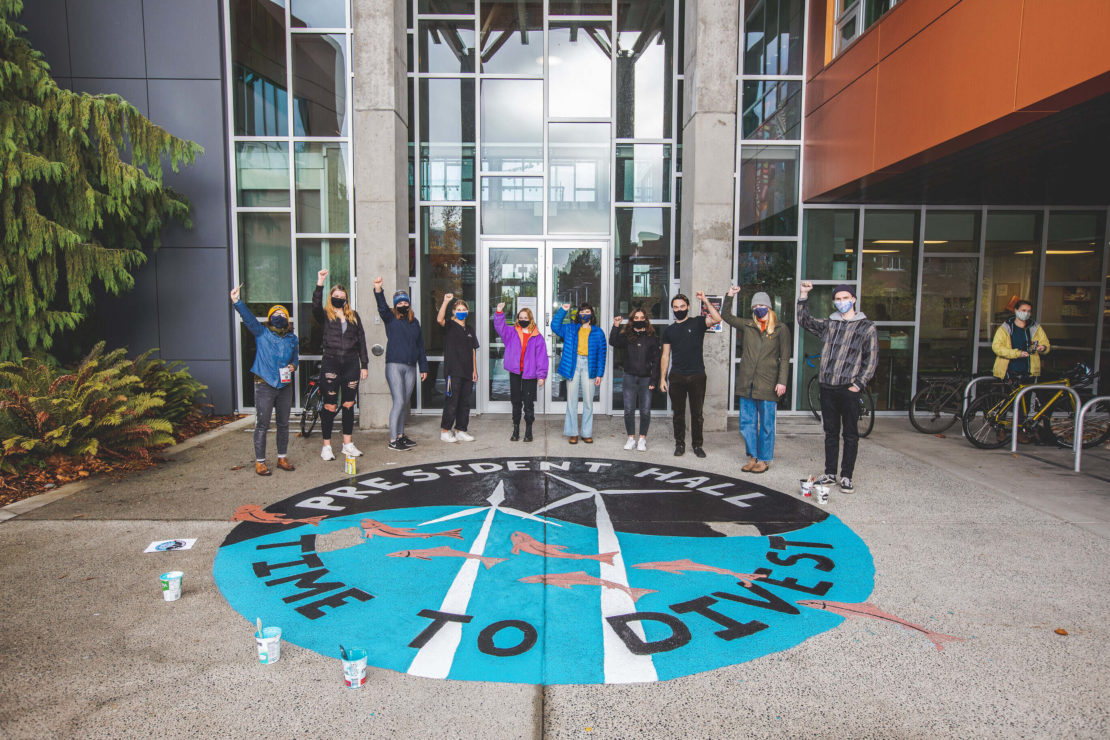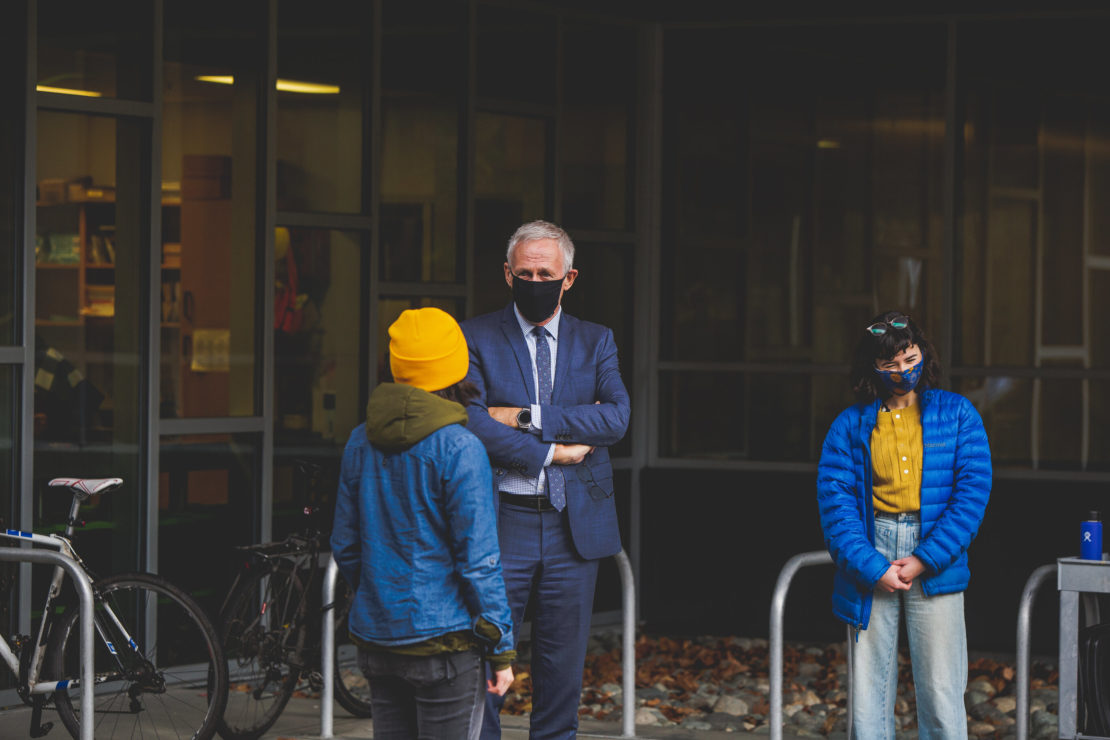Divest UVic teams up with artist Emily Thiessen to paint President Hall a unique welcome

On Wednesday, Nov. 18, a dozen members of Divest UVic assisted artist and alumni Emily Thiessen in painting a mural. The demonstration was intended to welcome new UVic President Kevin Hall. On the ground outside the doors of the Michael Williams Administrative Building, the 14-foot mural read, “President Hall, Time to Divest.”
The physically distanced live-art protest seeked to encourage the full divestment of UVic’s investment portfolio from the fossil fuel industry.
“Students are feeling really hopeful that President Hall will bring new energy and enthusiasm for taking substantive climate action,” said Emily Lowan, the UVSS Director of Campaigns and Community Relations. “As we all know, the effects of climate inaction are already being felt globally and we can’t continue to waste time and energy on greenwashing policies.”
In 2019, Divest UVic changed from a club to an official UVSS campaign. Divest UVic lobbies the university to remove all funds it has invested in fossil fuel industries and freeze any future investments in those industries. The club was founded in 2013, and has strong student and faculty support. In 2015, students voted 77% in favour of divestment, and in a 2019 referendum, 77% of faculty agreed.
“I am sad that this campaign has been so long-lived,” said Thiessen, who was a Divest UVic organizer from 2013-2017, and graduated with a degree in Anthropology two years ago.
Thiessen was the artist behind the giant street mural painted on the intersection of Fort and Douglas during the Global Climate Strike on Sept. 27, 2019 that said, “11 Years to Change Everything.” Her murals can also be found in the Victoria Events Centre, the SUB, and in the City of Victoria Commercial Alley street gallery.
Thiessen’s work is often political. She says she is guided by Toni Cade Bambara’s famous quote, “the role of the artist is to make the revolution irresistible.”
“By just trying to imagine what a more beautiful or a better future could look like allows us to achieve it, because if you can’t visualize it, it’s much harder to make that happen,” she says.
The Divest mural was created using water soluble tempera paint and clay paint, and Divest UVic followed their promise to remove the mural only a few days later.
Lowan is feeling optimistic about Hall’s willingness to engage with Divest UVic. He visited activists twice during the painting session, and attended a meeting with Lowan and Sarina de Havelyn, UVSS Director of Outreach and University Relations the following day to discuss a broad agenda of student issues.
“I’m very encouraged by President Hall’s receptiveness and response to Divest UVic thus far, said Lowan. “It’s definitely a far warmer reception that we’ve received in past years to similar tactics and I think that we will have a stronger potential move towards divestment.”

In a video announcing UVic’s new president, released in August when Hall was still at his previous post at the University of Newcastle in Australia, he said that UVic’s commitment to climate action and sustainability should be the guiding force for the institution’s decisions. He also stated a clear commitment to reconciliation and the process of Indigenizing knowledge and education.
Divest UVic believes the connection between these values is clear. In a letter from the UVSS, the Graduate Students’ Society, and UVic Faculty for Divestment to President Hall dated Nov. 6, they wrote, “there is an opportunity to align UVic’s commitments to reconciliation and sustainable futures through divestment. Both of these priorities are currently clouded by the university’s fossil fuel investments.”
The letter also states that the UVic endowment fund is invested in Imperial Oil and Exxon Mobil, who have histories of climate change denial. They are also invested in Enbridge, which is pushing a contentious pipeline project through opposing Chippewa and Ojibwe territories.
In January, the UVic Board of Governors created a Responsible Investment policy which proposes reducing the “carbon intensity” of the university’s short-term investments and bonds portfolio by at least 45 per cent by 2030. The policy does not apply to UVic’s main endowment fund, and has major gaps in scope that will challenge the policy’s ability to reach its goals.
The letter also states that fossil fuel industries are reporting negative trends, and that it would make more sense for the university to retract its financial support now. It states that the UVic Foundation has lost $9 million on fossil energy investments so far this year.
Lowan says that actions like the Responsible Investment policy are greenwashing.
“Everyone wants to present themselves as taking the climate crisis seriously, but when their climate plan allows them to stay heavily invested in the industry mainly responsible, they are clearly doing nothing of the sort,” Lowan said.







